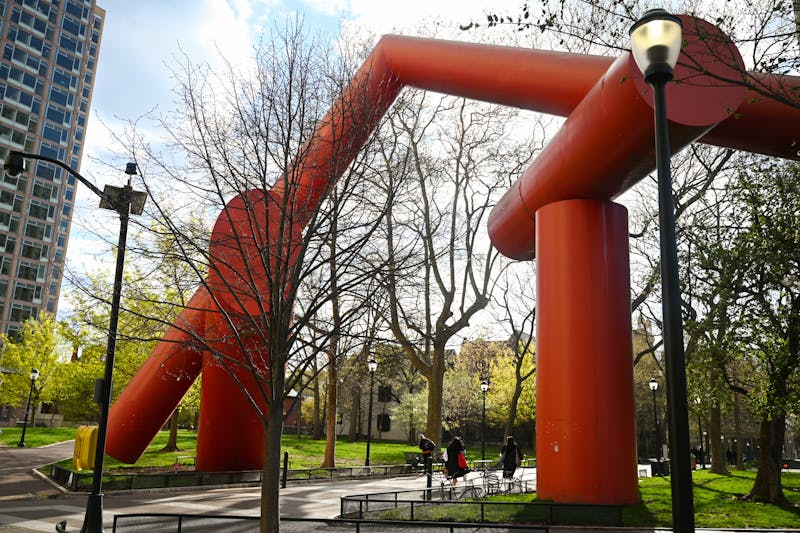If you have an iPod and it's not full, then you're doing something wrong. Apple made a really great gadget when it made the iPod.
For about $300, you can store approximately 1,000 CDs in a space formerly occupied by one of those annoying jewel cases. But the powers that be soon realized people could use their iPods for music-pirating orgies that would make peer-to-peer downloading seem downright prude.
Probably threatened by our friends at the Recording Industry Association of America, Apple made sure that iTunes did not allow people to get music off their iPods and thus be able to share it.
It didn't take long for some smart kids, just itching to stick it to the man, to figure out how to get around Apple's pathetic sham.
An iPod is just a hard drive in a plastic box and its files are easily accessible in "My Computer." All Apple did to cover its ass was make the iPod's music folder a hidden folder; all you have to do is "show hidden files and folders" and then drag that magically appearing directory to your desktop.
There's your music.
Now bring your kindergarten sharing skills to new heights by repeating those steps with the iPods of your friends, families, roommates, neighbors and college housemates. Then update your iTunes library and voila! You're now Tower Records.
Congratulations.
I'm not arguing that music piracy is ethical. But neither is bribing radio stations to play records or charging $1 per downloaded song when a lot of the cost of a CD is in the packaging and distribution.
According to HowStuffWorks.com, packaging costs make up almost $4 of a $15 CD.
Because legal downloading eliminates packaging, distribution, as well as the retail middleman, it seems reasonable that a $15 CD should cost about $7 online. And that's a price most downloaders would pay, including me
Furthermore, record companies have been shafting musicians since Tommy Edison decided he liked the sound of his own voice.
In general, artists make about 10 percent of the retail price of CDs. Even worse, struggling musicians, with little leverage, have to bend to the demands of their label. They are often forced to violate their artistic integrity as their record company tries to 'broaden' their appeal. "Selling out," as it's called, is a degrading process for many artists, and only a few rebel musicians can resist the siren song of a record deal.
Music piracy may be illegal, but it's actually been a boon for many artists.
I spoke with Judy Hubbard, manager for her husband Ray Wylie Hubbard, an alternative country artist from Texas. She used to be in the "music piracy is wrong" camp. Now, she believes that illegal downloading is attracting legions of new fans from all over the country; places where Ray Wylie doesn't sell records or perform.
"We don't make much from our record sales since we're with a label. Even if someone illegally downloads an entire CD, we don't lose but a few cents. But if one of these downloaders, one of these new fans, comes to a show or buys a T-shirt, there's $15. Music piracy is bringing Ray Wylie new fans all the time. How can that be a bad thing?"
Music piracy is the best publicity an artist can get.
The RIAA is viciously defensive about piracy, and it's easy to see why. Record companies are losing tons of profit in CD sales, and they have nothing to gain from the democratization of music.
They're starting to feel the icy hand of death on their shoulder and are struggling against it like a great wounded beast.
I couldn't care less. Let them die.
With the Internet and digital technology, artists can do away with record labels and record-store middlemen all together. Artists can go the independent route, selling their music online.
Under this model, musicians keep their artistic integrity, make a higher percentage from their work and sell their albums at prices lower than conventional CDs. The death of the record companies is only a few years off, and that will be a great day for music.
Stick it to the RIAA by not wasting space on your iPod, and support the artists you love by buying their merchandise and going to their shows. If they're independent, buy their CDs too. You will feel really damn good.
Does anyone have any Lynyrd Skynyrd?
Alex Weinstein is a junior history major from Bridgeport, W.V. Straight to Hell appears on Thursdays.
The Daily Pennsylvanian is an independent, student-run newspaper. Please consider making a donation to support the coverage that shapes the University. Your generosity ensures a future of strong journalism at Penn.
DonatePlease note All comments are eligible for publication in The Daily Pennsylvanian.








